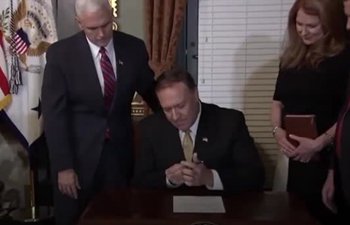by Raimundo Urrechaga
HAVANA, March 14 (Xinhua) -- The expected generational change in Cuba's top leadership will be the climax of an age transition in top positions, a Cuban political analyst said.
"Younger generations have already been governing in the country for several years. The fact (that) we'll soon have a president (who) isn't a Castro and is 30 years younger than our current president has, above all, a symbolic effect," Rafael Hernandez told Xinhua in a recent interview.
The remarks came as millions of Cubans voted on Sunday to elect more than 600 lawmakers to the National Assembly of People's Power, with the elected leaders representing a new generation in the Caribbean nation.
The legislative body will, in turn, elect the president in April.
Hernandez said the founding generation of Cuba's revolution has paved the way for younger leaders in various ministries, positions in the Communist Party of Cuba and the legislative authority.
The average age of the elected lawmakers is 49, while that of the Council of Ministers is 59, younger than historical leaders like Raul Castro, Ramiro Valdes or Jose Machado, who are all above 85.
The 86-year-old Castro, Cuba's current leader, announced in December that he would not seek re-election for a third five-year term. It is the first time since Dec. 2, 1976 that a person without the last name Castro would likely be the president.
It is expected that Castro's successor will be 57-year-old Miguel Diaz-Canel, the current first vice president. His election should not bring about major changes as he has been defending Cuba's political continuity and maintaining the socialist model, the analyst said.
"The challenge of (the) future government is to respond quickly to the population's demands and executing political and economic changes," he said.x Hernandez stressed that a major task of the younger leaders would be to continue the reform and modernize the economy.
The future leadership is aware of the importance of implementing key reforms such as ending the double currency system, and increasing productivity, efficiency and salaries in the state sector, he said.
Regarding the turnout for Sunday's elections -- 82.9 percent -- Hernandez said though lower than in the previous years, it was "still extraordinarily high."
The academic pointed out that most elected lawmakers are local leaders who work in their communities, which will increase parliament's work and contact with ordinary citizens.
According to official data, women comprise 53.22 percent of the legislative women; 13.22 percent are people under 35, while 40.50 percent are Afro-Cubans.
The elected lawmakers will meet in Havana on April 19 for the first session of the National Assembly's new legislature.
On that day, the historical generational change will be furthered as the new legislators vote for the 31-member State Council, including its new president, first vice president and five vice presidents.













